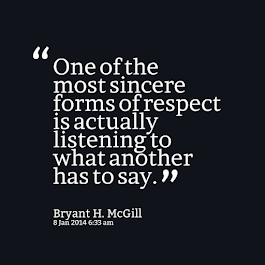Have you ever had a conversation with someone for whom you worked and you just knew they were not listening to you? They were physically in the room with, you but it was obvious that their mind and attention were a million miles ways. Or, perhaps, they were listening, but not to hear you and understand but to better prepare their comeback and reply to you. In either case, you leave disheartened and frustrated. We have all been there.
Much has been written about listening as a skill, the role listening plays in the communication process (my late wife would often tell me that she did not want me to do anything when she was venting, she just wanted me to LISTEN!), and the role of listening in leadership. A nice article on the subject is here. My purpose here is not to provide a tutorial on listening nor to provide one of the many step by step processes for active listening. You can look that all up. My purpose is to just emphasize the fact that leaders NEED to listen, really LISTEN. Too many don't!

Yesterday I wrote about respect. Listening, real listening, is a sign of respect to another person. As we covered yesterday, respect is earned. One giant step toward that is developing the skill and habit of listening. Hear and understand what people are sharing with you. Discern what it is that they want or need. Not everyone wants you to fix something. Some just want to be heard. But, those who DO want you to fix something need to leave feeling that they have been heard. I frequently use the example of a former supervisor of mine. I did not always agree with the decision that was made (that is just leadership), but I ALWAYS felt heard. I never left a conversation felling like I had been blown off, just humored, or completely ignored. When people feel heard, they feel empowered, even if the outcome does not go their way.
There are several tried and true best practices that leaders can employ to help them better understand and to let people know that you are really listening to them:
1) Take Notes (if appropriate) Depending on the context of the conversation, writing things down so you don't forget and so the person you are talking with sees that you are taking them seriously is a great practice.
2) Repeat back what you just heard. I have to admit that I used to struggle with this one. "What I heard you say is that..." always sounded too scripted and formula driven for me. I was wrong. While I personally adjust the wording, repeating what you think you just heard does two things: a) it communicates that you were in fact listening, and b) it verifies the information that you received. Over the years there have been many times that I have done this only to have the other person tell me that I really got it wrong. This gave them the chance to clarify what it was that they wanted to communicate and gave me the opportunity to REALLY understand what they were saying to me.
3) Ask them "What is it you need from me?" This does a couple of things: a) it clearly clarifies what it is that they want. Frequently I have asked this only to have the other person tell me "Oh nothing, I just needed to get it off my chest." and b) it gives both of you a clear path forward and defines next steps. This gives you the opportunity to respond in a positive manner and set expectations. This is very powerful in that both of you leave without any false expectations of what should happen next.
In summary, in order to be effective, leaders must listen. Listening does not necessarily mean acquiescence, but acknowledgement that they have been heard and that they are valued. As a leader, you must not only value the members of your team, you must let them know that you value them. Listening to them is a great first step!!



No comments:
Post a Comment